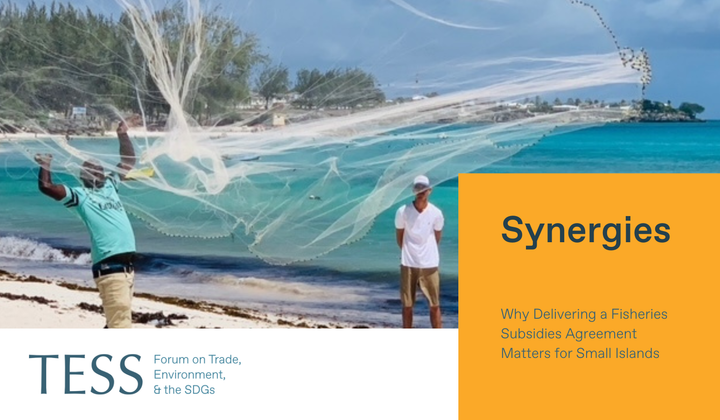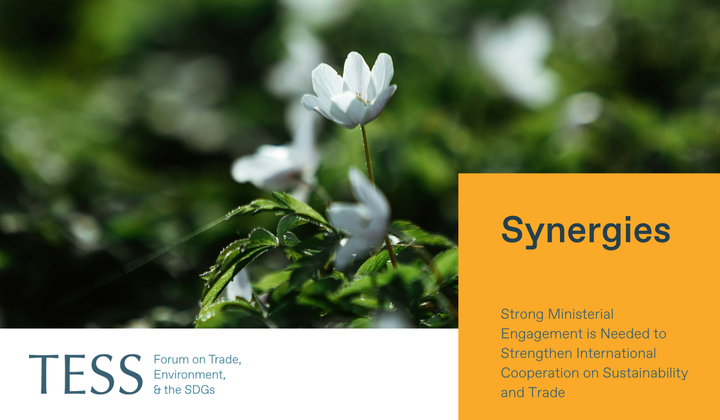The Thirteenth WTO Ministerial Conference (MC13) is an opportunity for Caribbean Community (CARICOM) countries to actively participate in shaping a trade policy framework that is equitable, sustainable, and inclusive.
This article is part of a Synergies series on reviving multilateralism curated by TESS titled From Vision to Action on Trade and Sustainability at the WTO. Any views and opinions expressed are those of the author(s) and do not necessarily reflect those of TESS or any of its partner organizations or funders.
-----
As the Thirteenth WTO Ministerial Conference (MC13) commences, its once lacklustre agenda has been infused with new life. This biennial assembly of the highest body of WTO members, convening from 26–29 February in Abu Dhabi, now promises to tackle critical decision-making areas for global ministers of trade. Topics range from fisheries subsidies and agriculture to development, e-commerce, dispute settlement, and, notably, WTO reform. Recently, a surge of enthusiasm has been sparked by an emerging, consolidated text aimed at reforming the WTO’s dispute settlement mechanism, suggesting a more substantive dialogue than initially anticipated.
WTO Reform: A Gateway to Transformation
Among the diverse topics on the MC13 agenda, reform of the WTO stands out as a beacon of hope for transforming an organization that has long been perceived as exclusive to nation states. At the last ministerial meeting two years ago, members emphasized the need for a system that is member-driven, transparent, inclusive, and responsive to the needs of all, including developmental issues. This vision paves the way for not only enhancing the organization’s efficiency and procedural transparency but also ensuring its relevance in an era where trade is inextricably linked with sustainable development, digital transformation, environmental stewardship, and social equity.
Advancing Sustainable Trade
For advocates of integrating sustainability into trade, the expansion of the WTO agenda is a significant stride forward. In the past 18 months, I have co-led the Remaking Trade for a Sustainable Future project, which has hosted 10 workshops, uniting over 400 experts in trade and sustainability. This collaborative effort culminated in the Villars Framework for a Sustainable Trade System, a comprehensive report offering recommendations for shaping the WTO into a more sustainable, equitable, and transparent entity. The project underscores the critical role of trade in fostering sustainable goals—encompassing climate action, ocean conservation, rights of marginalized groups, digital inclusion, and financial and technological accessibility. It confronts the long-standing aversion of traditional trade agendas to these pressing global challenges, highlighting the disconnect between current trade practices and the Sustainable Development Goals adopted by the United Nations in 2015.
The project underscores the critical role of trade in fostering sustainable goals—encompassing climate action, ocean conservation, rights of marginalized groups, digital inclusion, and financial and technological accessibility.
Challenges and Opportunities for CARICOM
A proposal from the European Union, urging the WTO to adopt a more substantive “deliberative” role in addressing global challenges, has raised pivotal questions for the WTO membership. Debates centre around whether the WTO should confine itself to traditional issues such as agriculture, market access, and dispute settlement, or embrace emerging concerns like e-commerce, environmental sustainability, and plastic pollution. The crux of these discussions also includes the ongoing reliance on “consensus” within the WTO—a practice allowing a single country to veto decisions impacting all 164 members. These deliberations hold particular significance for CARICOM (Caribbean Community) member states, which have historically adopted a conservative approach to trade negotiations, especially regarding the sustainability agenda. It may be time for CARICOM to reassess and potentially recalibrate its stance in these global trade discussions.
Sustainable Development and Trade Policy
The WTO’s reform agenda offers a unique opportunity for CARICOM countries to harmonize sustainable development with their trade policies. Many CARICOM nations, like Saint Lucia with its pioneering climate change legislation and Barbados with its inclusive and sustainable economic growth strategy, have already acknowledged the importance of sustainability in their domestic policies. Yet, the challenge remains to integrate these values into their broader trade policies and negotiating stances.
Discussions at the WTO are now prompting a re-evaluation of how trade policies can be tailored to promote forward-looking trade interests. This includes advocating for a sustainable ocean economy, enhancing food security through favourable trade and agricultural policies, facilitating the transfer of green technologies, and securing access for sustainably produced goods and services. Concurrently, there is a need to mitigate the adverse effects of unilateral industrial policies from developed countries, which could hinder the export potential of CARICOM states. The WTO stands as a unique forum for engaging with the international community on these critical issues in a transparent and inclusive manner.
Inclusivity and Civil Society Engagement
Another key topic at the WTO is the role of inclusivity and civil society engagement in trade discussions. While there is concern that broadening stakeholder participation might overshadow the specific needs of developing countries like those in CARICOM, a more inclusive approach could enrich the trade dialogue. Experiences from the 2023 UN Climate Conference (COP28) illustrate the benefits of incorporating diverse perspectives from different stakeholders, including those from entrepreneurs, micro, small, and medium-sized enterprises (MSMEs), women, indigenous communities, non-governmental organizations (NGOs), and academic institutions. It is clear that the WTO must endeavour to amplify these varied voices, as they are integral to ensuring that the trade system leads to a fairer distribution of gains and provides greater procedural access.
My
own institution, the Shridath Ramphal Centre for International Trade Law,
Policy and Services (SRC), has experienced the value of this approach, having
been invited to participate in sustainability discussions organized by civil
society groups and NGOs, such as the Forum on Trade, Environment, & the
SDGs (TESS) and the International Institute for Sustainable Development (IISD).
CARICOM’s civil society, increasingly active in climate action, recognizes the
pivotal role of multilateral institutions in promoting climate justice, as
evidenced by the Caribbean
Climate Justice and Resilience Agenda 2023–2030. This
initiative brought together over 40 civil society groups from across the
region, advocating for a more inclusive approach to multilateral negotiations.
By incorporating these voices, governments and trade negotiators can ensure
that trade policies serve the broader society, not just a select few.
Consensus or No Consensus?
A critical concern in these discussions is how these diverse interests and voices can be integrated into the WTO agenda. While the principle of “consensus” at the WTO serves as a safeguard against the dominance of larger interests, it should not impede progress on issues critical to smaller nations like those in CARICOM. CARICOM states are active in various plurilateral, member-driven negotiations, such as Investment Facilitation for Development, Dialogue on Plastics Pollution, and Trade and Environmental Sustainability Structured Discussions. Notably, a CARICOM ambassador chairs the group on MSMEs. If consensus cannot be reached on continuing these negotiations, the interests of these smaller economies could be adversely affected.
The Villars Framework proposes that the WTO consider a new decision-making mechanism allowing a majority of members to agree on procedural decisions, such
as setting up new plurilateral negotiations or adopting an agenda. This approach would promote a form of “responsible consensus” on more substantive issues, encouraging countries not to arbitrarily veto decisions but rather to opt out of decisions they find contrary to their vital interests.
The Villars Framework proposes that the WTO consider a new decision-making mechanism allowing a majority of members to agree on procedural decisions, such as setting up new plurilateral negotiations or adopting an agenda.
Is Special and Differential Treatment Still Relevant?
Special and differential treatment remains a cornerstone principle for CARICOM in the WTO reform dialogue. Like other developing countries, CARICOM has legitimate concerns about the effectiveness of special and differential treatment in integrating their economies into the global trade system. The controversy primarily revolves around the eligibility for special and differential treatment—which countries are entitled to special relaxations from the rules, such as extended timelines and preferential access.
Setting aside the debate over whether larger emerging economies like China, India, and South Africa should be considered developing, CARICOM can certainly advocate for an agenda that acknowledges its unique vulnerabilities. This could be based on criteria such as the UN Multidimensional Vulnerability Index, which accounts for environmental and economic vulnerabilities. Additionally, legal recognition in other agreements, including the Paris Agreement, should be considered as grounds for CARICOM to receive greater support in meeting the financial demands imposed on them. This raises the question: why should these vulnerabilities not be grounds for special accommodation under trade rules as well?
A Critical Juncture for CARICOM
In conclusion, MC13 represents an important juncture for CARICOM countries. It is an opportunity to actively participate in shaping a trade policy framework that is equitable, sustainable, and inclusive. This article does not suggest that CARICOM should uncritically accept the proposals of other countries that may not align with their interests. Rather, it advocates for a more open approach to how the trade system can be attuned to the climate, fairness, inclusivity, and equity needs of Caribbean countries. The MC13 agenda has initiated a conversation about promoting a vision for a trade system that respects the planet, promotes social equity, and supports the economic aspirations of all nations, both large and small.
-----
Jan Yves Remy is Director of the Shridath Ramphal Centre for International Trade Law, Policy and Services at the University of West Indies, Cave Hill Campus.
This article was first published in Trading Thoughts by the Shridath Ramphal Centre for International Trade Law, Policy and Services.
-----
Synergies by TESS is a blog dedicated to promoting inclusive policy dialogue at the intersection of trade, environment, and sustainable development, drawing on perspectives from a range of experts from around the globe. The editor is Fabrice Lehmann.
Disclaimer
Any views and opinions expressed on Synergies are those of the author(s) and do not necessarily reflect those of TESS or any of its partner organizations or funders.
License
All of the content on Synergies is licensed under a Creative Commons Attribution-NonCommercial-ShareAlike 4.0 International (CC BY-NC-SA 4.0)
license. This means you are welcome to adapt, copy, and share it on your platforms with attribution to the source and author(s), but not for commercial purposes. You must also share it under the same CC BY-NC-SA 4.0 license.
If you would like to reuse any material published here or if you have any other question related to Synergies, send an email to fabrice.lehmann@graduateinstitute.ch.




